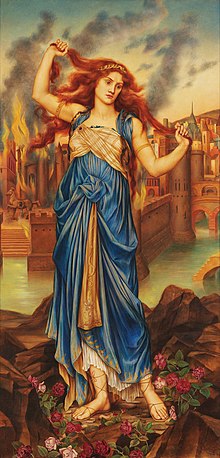Cassandra (novel)
Swiss composer Michael Jarrell has adapted the novel for speaker and instrumental ensemble, and his piece has been performed frequently.
Cassandra's narrative begins by describing her youth, when she was Priam's favorite daughter and loved to sit with him as he discussed politics and matters of state.
At times their interactions are tense or even cold, notably when Hecuba does not sympathize with Cassandra's fear of the god Apollo's gift of prophecy or her reluctance to accept his love.
It is Aeneas' father Anchises who tells Cassandra of the mission to bring Hesione, Priam's sister who was taken as a prize by Telamon during the first Trojan War, back from Sparta.
When Paris finally tells her explicitly what she already knows, she protests to her father, but he rejects her plea to negotiate peace and orders her to be silent.
Although Priam's political motives ostensibly drive Troy to war, the palace guard Eumelos is the true force behind the conflict.
Anchises explains that Eumelos, by convincing the Trojans that the Greeks were enemies and inciting them to fight, made his own military state necessary and was thus able to rise to power.
Eumelos executes his plan after all, and Achilles is killed, requesting as he dies that Odysseus sacrifice Polyxena at his grave for her betrayal.
It is not until Cassandra lives in a community with other women, literally at the margin of the city, that she identifies with a group and includes herself in it by the pronoun "we."
As she prepares to face her death, she is overwhelmed by emotions, and both to distract herself from and to make sense of them, she occupies her thoughts with reflections on the past.
Throughout the novel Cassandra spends a good deal of time in introspection, examining and even critiquing her personality, her perspective, and her motives as she was growing up in Troy.
